Sunday, 15 July 2007
Distance 28 km
Duration 5 hours 30 minutes
Ascent 337 m, descent 443 m
Map 57 of the TOP100 blue series (now superseded)
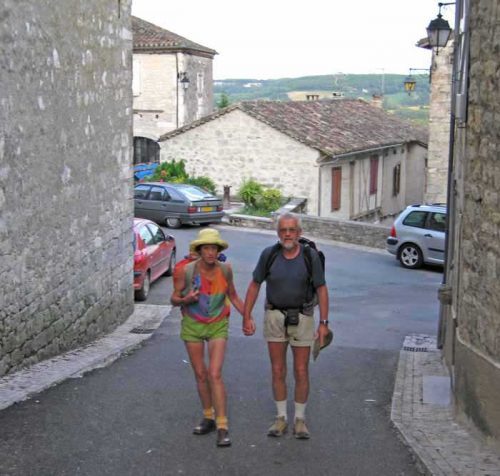
Despite our late night, we woke at the relatively normal time of 6:30. Our friend Philip was already up and wondering whether to rouse us, as we had said we wanted to leave at seven. We gulped a bowl of muesli and marched off only ten minutes later than our intention.
Once down in the main square, we took the road north out of town to meet the highway, which we walked along for three kilometres, past Saint-Dauniès, until the turn-off to Bagat-en-Quercy.
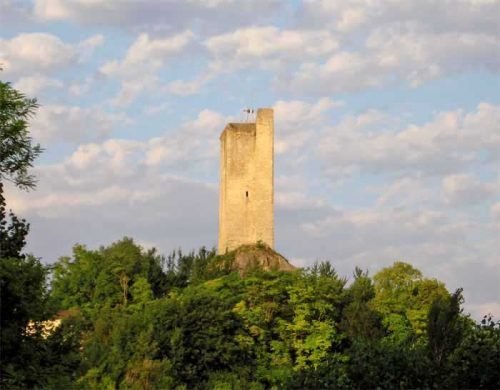
It was a tiny road leading to a tiny village, but all the prettier for that.
The crops of sunflowers, onions, wheat and peas were a pleasure to behold, and so was the village, when we got to it.
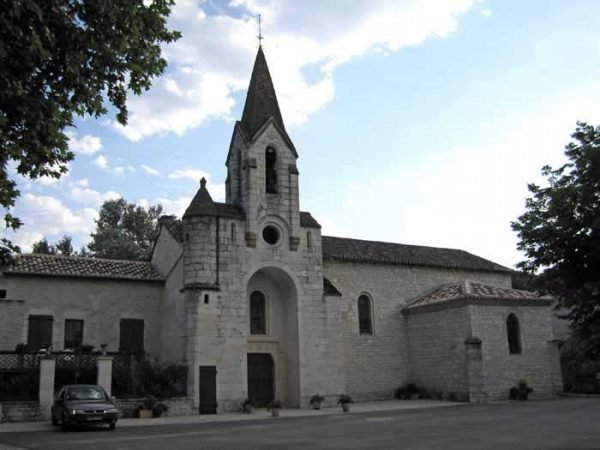
From there we went six more kilometres on the same road, at first following the gradual rise of the stream, then climbing suddenly to the causse, across which level expanse we could see the distant steeple of the church at Sauzet.
As we came nearer, it looked less and less likely to be the sort of village with a shop, let alone a bar, but we were proven wrong in the most delightful way when a large Logis de France hotel appeared before our eyes.
On the wistaria-covered terrace, guests were having breakfast and we joined them with alacrity. It was 9:45, just right for morning coffee.
We got a single croissant, as we also had a tarte tatin left over from the communal repast last night.
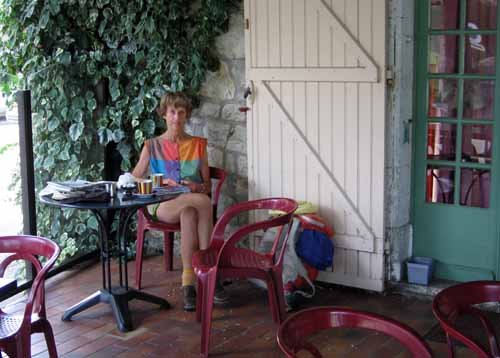
With the coffee working its magic in our veins, we set off on a thread of a road (D137) towards Luzech.
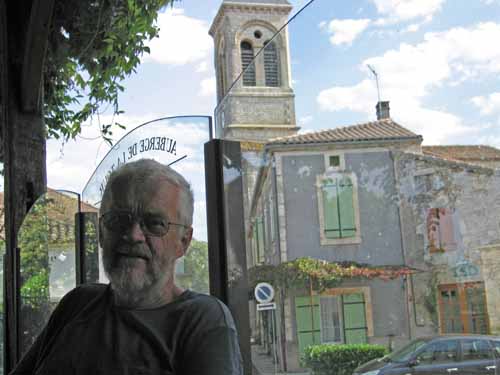
Cars were few, the countryside was undulating and on all sides were plantations of vines of the Cahors appellation, the dark, strong wine of the district.
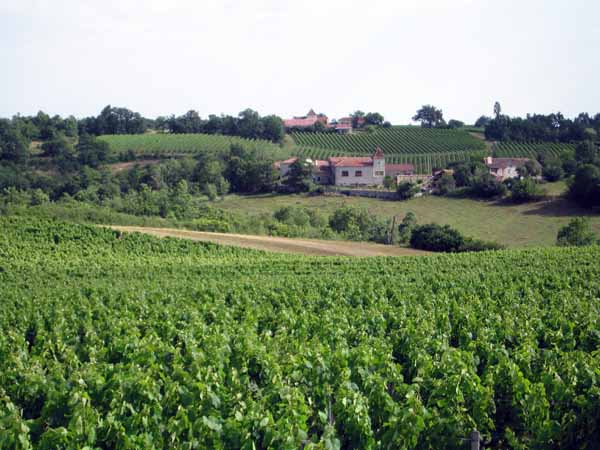
The sun shone serenely, without great heat. We entered a forest and began to descend to the river, hearing the bells before we caught sight of Luzech, which was our destination for the day.
At Luzech the Lot makes the same sort of exaggerated loop that the Tarn does at Ambialet, with only a few metres of road separating the two bridges, and on those few metres the main shopping centre is crammed. The road was formerly a canal but was filled in for reasons unknown.
True to our golden rule, we first sought out the Office of Tourism, which was just around the corner, but found it closed, as it was slightly after noon.
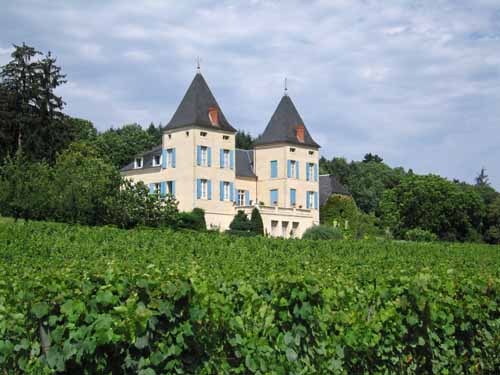
The best idea seemed to be to sit down for a second round of coffee while we considered what to do. The waitress assured us that they would be open in the evening for dinner. She was trying to set tables for lunch but the wind was making it hard for her.
While we were sitting there, we noticed a sign to the municipal camping ground, pointing back over the bridge that we had arrived on, and since it was two hours until the Office of Tourism re-opened, we thought it worth the risk to trust the signs. In this we were mistaken.
It soon became apparent, when we had pursued the riverside road for a while, that the camping ground was not to be found. I asked a man pruning his roses and got the dispiriting news that the camping ground had closed years ago, but there was a place at Caix, three kilometres the other side of Luzech.
This required thought. We found a piece of grass behind a low hedge, in front of the gendarmerie, and retired there to have lunch. Realising that we had hardly any water and every likelihood of having to continue walking, Keith looked around the nearby sports complex for a tap, but found none.
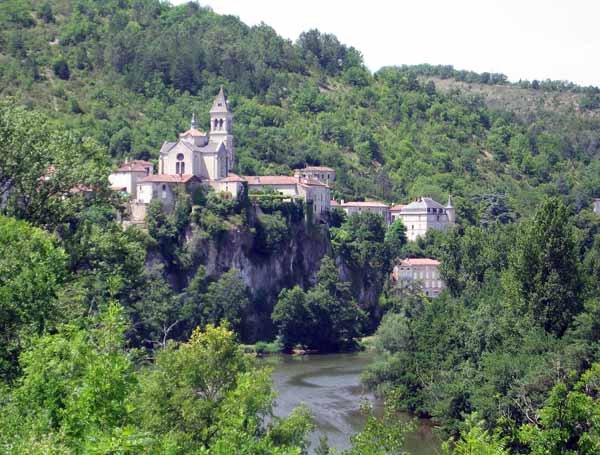
I went back to the house of the rose-pruning man and found him and his wife having lunch under a pergola. When I said we were thinking of pressing on to Prayssac (about fifteen kilometres downstream), they suggested that Albas was nearer, and had both camping and eating, as well as a beautiful position above the river.
Having kindly filled our water bottles for the journey, they sent us off with the courtesy that is seemingly ingrained in French society, at least in the provinces.
It was only six kilometres further to Albas, once again through a green ocean of vines. We saw the village from a distance and it was indeed a pretty little place, perched on a slab of rock rising vertically from the water.
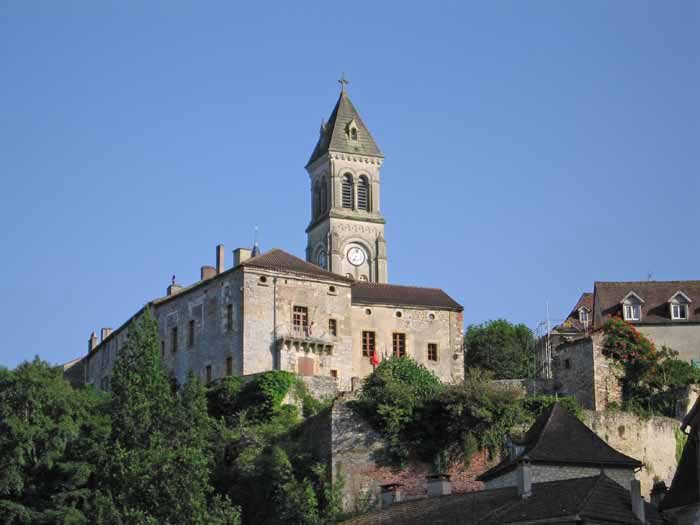
The church was at the top, and from there a small road, lined with stone cottages (including a restaurant), led down steeply to river level, where there was a spindly metal bridge, possibly a temporary replacement for an earlier one. At the bottom, an outdoor bar was packed with Sunday drinkers. Beyond that was a weir with a hydro-electric plant, then the camping ground.
There were several caravans and tents but no sign of the manager, as usual. We made ourselves comfortable under a tree and had showers and a rest.
It was then that I remembered that I had hung one of my two pairs of undies out to dry last night at Montcuq and forgotten to retrieve them, so I was now down to a single pair, that I would have to wash every afternoon from now on.
There had been a rock concert in the grounds on Bastille Eve and there were mountains of rubbish waiting for the garbage truck, but they were neat, housewifely mountains, not squalid ones.
A convoy of caravans, evidently a club, entered the gates nose-to-tail like a Chinese dragon and formed a ring on the riverbank. In the emplacement next to us, a man spent the whole afternoon on, in, under and beside his campervan, tenderly washing and polishing it.
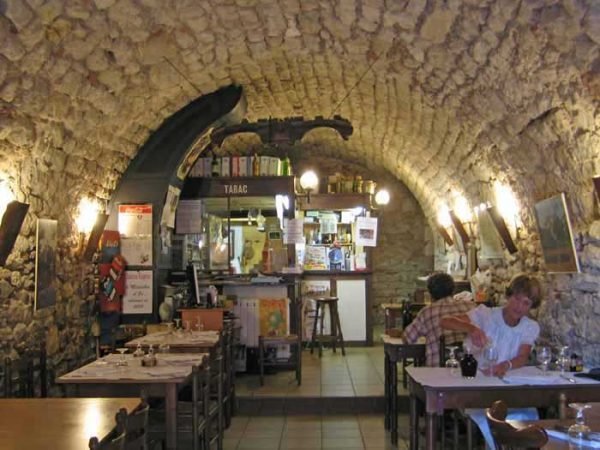
Later we were amazed to see a young woman with a pack walk into the camping ground. However she was not a walker. She had arrived from Toulouse by train and bus to do a week’s training in viticulture.
At 7 o’clock we ventured out to the bar near the bridge and had our usual rosé. At the tables around us, the caravan club were onto their umpteenth round of beer.
Then we climbed the narrow street to the restaurant, which was a former cellar, to judge from its rough-cast stone vault. Our enormously fat host took our order with formal courtesy and transferred it to his African wife, who was the cook.
We had green salads, then steak with Roquefort sauce and little sautéed potatoes, all washed down with a half-litre of Cahors red.
Previous section: Puycelci to Montcuq